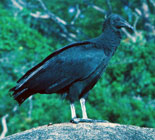 |
 |
 |
Articles
Thinking Through Nature: Philosophy for an Endangered World
University of Oregon
19-22 June, 2008
"Conservation Biology & Animal Rights: An All-Inclusive Ethic"
By Michael Tobias, President, Dancing Star Foundation
2:15 - 4:45 p.m., Thursday, June 19th, 2008
This 21/2 hour presentation included a sneak preview (and Oregon premiere) of Dr. Tobias & Jane Morrison's latest 89-minute Dancing Star Foundation feature film documentary, "Hotspots," based on the hotspots methodology, and filmed throughout many of the biologically richest and most endangered terrestrial eco-regions on earth. The film, hosted by Dr. Russell Mittermeier, President of Conservation International, raised call to scientists, governments, communities, NGOs and NGIs (non-governmental individuals)to work assiduously towards finding innovative and effective ways to save the remaining precious habitat on Earth.
Dr. Tobias' talk focused upon the traditionally sundered fields of animal rights and conservation biology; seeking to understand why animal rights has been marginalized and what pre-existing biases within the sciences have all but banned its very mention. Dr. Tobias referenced trends which counter this bias: from the history of physiolotry (the love of nature) to comparative literature and art history, as exemplified, for example, in field research that is non-intrusive. An ethic exemplified, for example, by the late ornithologist Alexander Skutch who showed that good science need not employ killing for specimens as a necessary corollary. Skutch, in contrast with Audubon and his legacy (which continues in the guise of museum collections today, and invertebrate bioassays) subscribed to an approach of field research that is altogether applicable to the animal rights ethic. Similarly, the fast-emergent field of immuno-contraception as an efficacious alternative to lethal forms of mitigating wildlife conflicts, particularly island bioinvasives, offers many regions, such as New Zealand, a wholly different mindset that is both animal rights and conservation biology centered.
The embrace of such changes is giving rise to a sea change. Tobias discussed certain vegetarian tribes whose diet and consumer behavior is ethically driven, their ecological footprints clear signs of the biological benefits; and of a behavior that comports with a new paradigm of international ecological idealism that sees globalization as a force for inspiring new standards by which society may judge character and virtue; a compass reading of what human societies are actually capable of achieving. The Jain principles of Ahimsa (nonviolence) and Anekant (tolerance) for example, have never been so relevant to environmental ethics. Rajasthani Bishoi, Tamil Nadu Toda, and Bhutanese Brokpa, have much to teach us in the West not only in terms of sustainability, Gross National Happiness, biodiversity conservation, and traditional wisdom, but also, and most critically, how to relate to other species in non-violent ways.
 BACK TO TOP
BACK TO TOP
 |
|
 |
|
Thinking Through Nature: Philosophy for an Endangered World
University of Oregon
19-22 June, 2008
"Conservation Biology & Animal Rights: An All-Inclusive Ethic"
By Michael Tobias, President, Dancing Star Foundation
2:15 - 4:45 p.m., Thursday, June 19th, 2008
This 21/2 hour presentation included a sneak preview (and Oregon premiere) of Dr. Tobias & Jane Morrison's latest 89-minute Dancing Star Foundation feature film documentary, "Hotspots," based on the hotspots methodology, and filmed throughout many of the biologically richest and most endangered terrestrial eco-regions on earth. The film, hosted by Dr. Russell Mittermeier, President of Conservation International, raised call to scientists, governments, communities, NGOs and NGIs (non-governmental individuals)to work assiduously towards finding innovative and effective ways to save the remaining precious habitat on Earth.
Dr. Tobias' talk focused upon the traditionally sundered fields of animal rights and conservation biology; seeking to understand why animal rights has been marginalized and what pre-existing biases within the sciences have all but banned its very mention. Dr. Tobias referenced trends which counter this bias: from the history of physiolotry (the love of nature) to comparative literature and art history, as exemplified, for example, in field research that is non-intrusive. An ethic exemplified, for example, by the late ornithologist Alexander Skutch who showed that good science need not employ killing for specimens as a necessary corollary. Skutch, in contrast with Audubon and his legacy (which continues in the guise of museum collections today, and invertebrate bioassays) subscribed to an approach of field research that is altogether applicable to the animal rights ethic. Similarly, the fast-emergent field of immuno-contraception as an efficacious alternative to lethal forms of mitigating wildlife conflicts, particularly island bioinvasives, offers many regions, such as New Zealand, a wholly different mindset that is both animal rights and conservation biology centered.
The embrace of such changes is giving rise to a sea change. Tobias discussed certain vegetarian tribes whose diet and consumer behavior is ethically driven, their ecological footprints clear signs of the biological benefits; and of a behavior that comports with a new paradigm of international ecological idealism that sees globalization as a force for inspiring new standards by which society may judge character and virtue; a compass reading of what human societies are actually capable of achieving. The Jain principles of Ahimsa (nonviolence) and Anekant (tolerance) for example, have never been so relevant to environmental ethics. Rajasthani Bishoi, Tamil Nadu Toda, and Bhutanese Brokpa, have much to teach us in the West not only in terms of sustainability, Gross National Happiness, biodiversity conservation, and traditional wisdom, but also, and most critically, how to relate to other species in non-violent ways.

